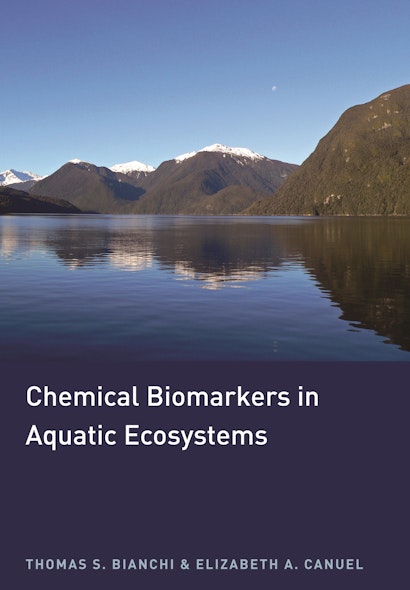This textbook provides a unique and thorough look at the application of chemical biomarkers to aquatic ecosystems. Defining a chemical biomarker as a compound that can be linked to particular sources of organic matter identified in the sediment record, the book indicates that the application of these biomarkers for an understanding of aquatic ecosystems consists of a biogeochemical approach that has been quite successful but underused. This book offers a wide-ranging guide to the broad diversity of these chemical biomarkers, is the first to be structured around the compounds themselves, and examines them in a connected and comprehensive way.
This timely book is appropriate for advanced undergraduate and graduate students seeking training in this area; researchers in biochemistry, organic geochemistry, and biogeochemistry; researchers working on aspects of organic cycling in aquatic ecosystems; and paleoceanographers, petroleum geologists, and ecologists.
- Provides a guide to the broad diversity of chemical biomarkers in aquatic environments
- The first textbook to be structured around the compounds themselves
- Describes the structure, biochemical synthesis, analysis, and reactivity of each class of biomarkers
- Offers a selection of relevant applications to aquatic systems, including lakes, rivers, estuaries, oceans, and paleoenvironments
- Demonstrates the utility of using organic molecules as tracers of processes occurring in aquatic ecosystems, both modern and ancient
"Bianchi and Canuel have teamed up to create a comprehensive work on chemical biomarkers in aquatic ecosystems. . . . [T]he first textbook of its kind."—Choice
"Chemical Biomarkers in Aquatic Ecosystems is a significant contribution to the field of organic biogeochemistry. . . . The combined discussions of both the biochemical formation of the biomarkers, as well as of their utility as process indicators is of particular importance and almost unique to this book. Thus, the reader will be able to understand the biogeochemical basis for the use of these compounds as biomarkers, rather than taking their applicability on faith. This alone is a significant difference between this book and all others, and puts Chemical Biomarkers in Aquatic Systems in a class of its own."—Josef P. Werne, American Mineralogist
"Bianchi and Canuel have done an extraordinary job of capturing the essence of biomarker geochemistry in their timely and important book. They give an in-depth overview of this discipline from its roots more than a half-century ago to the present day. In doing so, they explain the fundamentals of molecular and isotopic organic geochemistry, and they describe interesting applications of these tracers for improving understanding of organic matter origins and cycles in marine, estuarine, and freshwater settings."—Philip A. Meyers, professor emeritus, University of Michigan
"This book is a great introduction to molecularly based biogeochemistry. The authors take a multidisciplinary approach, especially in bringing together the methodologies of biochemistry, microbiology, genomics, and ecology. The bibliography is extensive and up-to-date, documenting the measurement, origins, roles, and fates of all major classes of biosynthetic compounds. Aspiring researchers will find this book an ideal companion with which to join the gathering forward surge of earth systems science."—Geoffrey Eglinton, coauthor of Echoes of Life
"This is a must-have volume for all hands-on researchers, in aquatic biogeochemistry, organic geochemistry, and molecular ecology, from beginning undergraduates to experienced senior researchers. Bianchi and Canuel have assembled a concise and up-to-date compendium, with extensive illustrations and references to the latest literature of the diversity of organic chemical biomarkers, their biosynthetic pathways, environmental distributions, and utility for characterizing biogeochemical processes in aquatic systems."—Stuart G. Wakeham, professor emeritus, Skidaway Institute of Oceanography
"This book is clearly needed and Bianchi and Canuel are the right people to have written it. It not only makes an excellent textbook, but is also a valuable addition to the personal libraries of geochemists, petroleum geologists, paleoceanographers, and ecologists."—David Burdige, Old Dominion University
"With sound scholarship and an appropriate cross section of references, this book bridges the gap between the traditional fields of organic geochemistry and aquatic biogeochemistry, and makes a significant contribution to the field of organic biogeochemistry. Of particular relevance is the discussion of the biochemical formation of biomarkers with their utility as process indicators."—Josef P. Werne, University of Minnesota, Duluth

